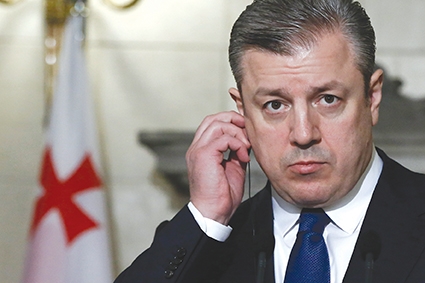Making the Picture Look Perfect
Op-ed
This year will mark the 100th year since Georgia declared independence and 10th since the August War. Where, over the last 100 years, we were defeated and lost independence and then were able to regain them, since the war in August 2008, we seem to have been beaten. The victorious Russians are widening the occupied territories one step at a time, creating symbolic states and holding presidential or parliamentary performances. The only thing we managed to gain was an agreement in return for letting Russia into the WTO, where the results of the war are in a way neglected. Otherwise, everything looks like a landscape in Greenland; like the picture which falls on the head of the main character at the end of the famous Georgian film Blue Mountains.
At the end of 2017, minutes before Prime Minister Giorgi Kvirikashvili’s swearing impromptu, a highly important piece of information was communicated. The PM said that he is personally planning to take part in the Geneva discussions. As the year came to a close, this message disappeared behind the abovementioned expletives incident, but when the passions subsided and now the days of Christmas hangover are behind us, this statement has gained a truly revolutionary meaning in light of the Georgian-Russian controversy.
The format of the Geneva Talks conveys the participation of both parties of a disagreement. For instance, the representatives from de facto governments of Sokhumi or Tskhinvali face IDP representatives of the Abkhazian and Ossetian government. Russian and Georgian diplomats argue over the existing problematic issues together. If we look closer at Kvirikashvili’s statement, this means that the leading Georgian official will talk with the leading official from Russia, meaning President Putin. Everyone, including officials in Geneva, knows that Putin won’t sit at a table with Kvirikashvili, which means that PM Kvirikashvili will probably meet Khajimba and Bibilov, which could be interpreted as acknowledgement of what Russia’s Foreign Minister Sergey Lavrov has been trying to put in our heads: “accept the new reality and put up with it.” Additionally, PM Kvirikashvili is also planning to grant the political decision mandate to the Geneva international discussions format. Translating this initiative into political language would mean that the government of the Georgian Dream plans to sign a non-aggression pact with the de-facto governments of the occupied territories, which was another demand from Russia that Lavrov tried to impose on us. It’s sad that this statement from Kvirikashvili remained beyond the attention of the political class, otherwise it wouldn’t have been hard to guess who’d “swear” at whom, the government at the opposition, or vice versa.
Meanwhile, the events developing on the occupied territories are such that we might not need to travel to Prague, let alone Geneva. The de facto government of South Ossetia is opening up a so-called customs checkpoint near the occupational line in Mosabrune village, near Akhalgori, where we already see the cabins the “customs officers” will live in and from which they will check any cargo that travels from the rest of Georgia into their “republic.” The occupational regime has already set the rule that the population residing in the Akhalgori region have the right to carry only up to 50 kg of goods per person. Moreover, it is prohibited to carry any kind of meat, eggs, and livestock or related products.
The opening of this so-called customs checkpoint is, in a way, blocking the agreement which was signed between the Revenue Service of Georgia and the Swiss SGS company. It is easy to imagine the tariffs that Tskhinvalian customs officers will impose on cargo carried from Armenia. Notably, following in the footsteps of Tskhinvali, the de facto government of Abkhazia has also announced that goods carried over the Enguri bridge will also be subject to taxes. As we see the finale is underway in the Russian-Georgian politics, the only thing in question now is when the “Greenland” will crash down on our heads.
Zaza Jgarkava












